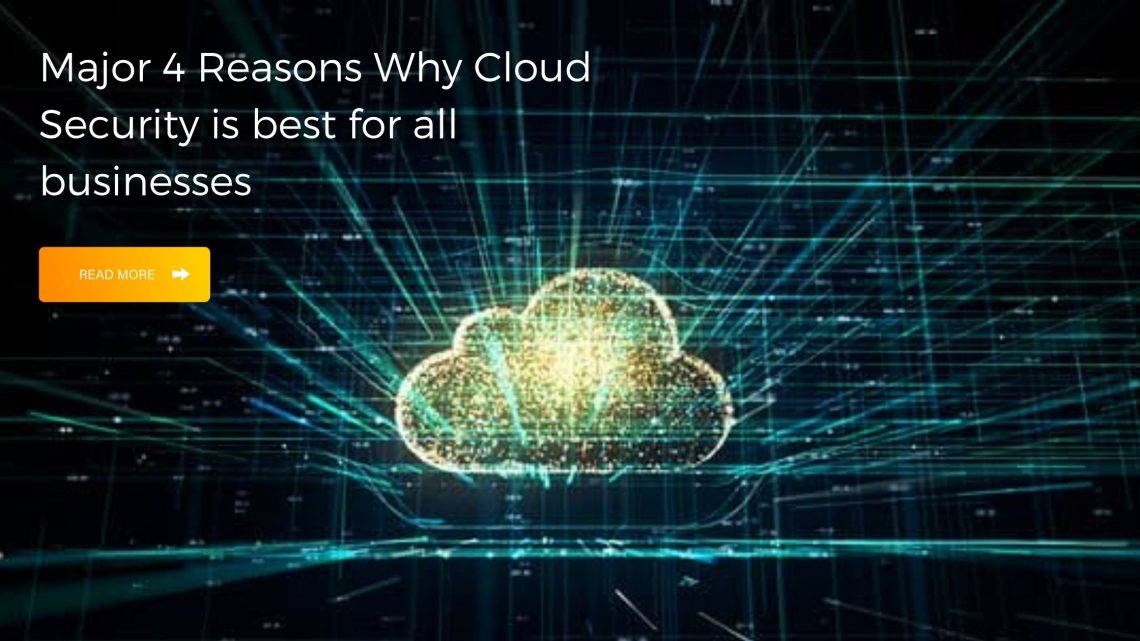
Major 4 Reasons Why Cloud Security is best for all businesses
Transferring the data to the cloud brings many benefits, promoting an extremely productive working atmosphere, allowing companies to meet customer expectations with strength and speed, minimizing operating costs, and protecting companies in the event of a natural disaster or some other disturbance. But when we talk about data security there’s another face too.
Business data is not tucked away securely in the office, but moves effortlessly among employees, computers, tablets, and other smart devices, with immediate access to customers, or to anyone else who has hands-on your information.
In reality, your sensitive data is not under your control at all, it is in the possession of many people all at once, and if they are not conscious of cyber threats, wrong people can get a hand on your data.
As small businesses are likely to have lower resources to dedicate to cybersecurity and less competence in monitoring threats to IT systems, experts suggest they are generally more prone to cyber-attacks.
Different reasons for the vulnerability of small businesses to data breaches:
*Lack of legal know-how and specialized security
*Fewer procedures and controls
*Remote workflow with less stable Wi-Fi
*Small companies give the global audience a ‘back door’
*Emails, websites, and payment processes are questioned for security
*Loopholes can cause data loss
Considering the cloud is a growing technology to protect data from cyber-attacks, SMB needs to take care of cloud protection for different reasons:
Error Exploitation
Human error is one of the causes of data breaches and cyber attacks, whether malicious or not, as experts find it responsible for as many as 95% of cyber lapses.
The breach of data may arise because of different reasons such as accidentally sending sensitive information to the wrong account, losing company gadgets, accessing with default passwords, or from criminal aspects. With several risks emerging around, many small businesses lack trackers, training, and communication to actually fix this type of security challenges.
Integration of data
No organization would compromise on when its a matter of data integrity. The integrity of data refers to securing data from unsolicited removal, fabrication, or remodeling. Maintaining the authority and access to specific business tools assures that sensitive data and resources are not misappropriated, misused, and stolen.
A standalone application with a dedicated database, data integrity is feasible. The independent system’s data integrity continues to take place through database transactions, while it ends up with the database management system ( DBMS). ACID, which is atomicity, continuity, isolation, and longevity, is the rule of transactions that businesses should adopt to assure integrity.
Authorization is a method of managing data access. It is a methodology that reflects the extent of data accessibility a particular authenticated user has.
Phishing Attacking
Phishing is a serious cyber-attack where an attacker sends emails to various recipients indicating a company’s reputable status. The email may contain catchy details with a hidden attachment or link to malware that motivates sensitive account and password details to join. Spear-phishing is a planned attack on a particular company or person.
Despite much consciousness about frequent attacks via email links, numerous phishing emails are still capable of manipulating their reliability and convince them. As hackers get a protected gateway to break tightened security networks, they become more confident.
Small businesses are prone to these attacks and look to cloud computing to get a robust solution for data backups in real-time. No wonder cloud secures data, but because of malicious attacks like Ransomware, the tag of security issues is still there.
Security frameworks oriented to Threat
Most SMBs have no resources needed to install reliable firewalls and high-security fixes, resulting in loss of data in the event of an attack. Cybersecurity is a multilayered issue that needs the latest technologies and the defined strategic planning and procedures.
Since SMEs are unlikely to have in-house technical experts, the only alternative is to rely on third parties to deploy robust firewalls with updated security patches. Yet alone this is not enough, because the elements of the employee still require to understand threats, security procedures, and controls over access.
Conclusion:
It’s simple to avoid the fact that data accompanies your employees to the office premises on-site and off-site, and that it must be secured all times.
Small companies can’t spend huge budgets on securing their online networks. However, there are intelligent and secure actions they can take to improve their security online, including using the advanced security protocols of the cloud vendors.
You can also get support from companies that hold the expertise and offer training to give you the best of the cloud if your company is expanding. For any details about Cloud-based Tally visit Tally-on-cloud.com.
Read other related blogs:
–7 Important points to consider while choosing a cloud service provider
–8 reasons why cloud database technology must never be ignored


